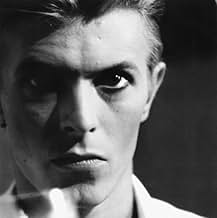एक एलियन को अपने मरते हुए ग्रह को बचाने के लिए इंसान का रूप लेना पड़ेगा, लेकिन एक औरत और दूसरे आदमियों के लालच जटिलतायें पैदा करते हैं.एक एलियन को अपने मरते हुए ग्रह को बचाने के लिए इंसान का रूप लेना पड़ेगा, लेकिन एक औरत और दूसरे आदमियों के लालच जटिलतायें पैदा करते हैं.एक एलियन को अपने मरते हुए ग्रह को बचाने के लिए इंसान का रूप लेना पड़ेगा, लेकिन एक औरत और दूसरे आदमियों के लालच जटिलतायें पैदा करते हैं.
- पुरस्कार
- 1 जीत और कुल 4 नामांकन
Jim Lovell
- Capt. James Lovell, Commander of Apollo 13
- (as Capt. James Lovell)
Dort Clark
- Waiter
- (बिना क्रेडिट के)
फ़ीचर्ड समीक्षाएं
Nicholas Roeg is a maverick filmmaker and The man who fell to Earth is one of the many reasons why. Bowie is an alien who lands on earth in search of water. This was the legendary singer's first starring role and he more than owns the role of a strange human trying to mix with humans. The surreal imagery by noted director Nicholas Roeg is a highlight and although the film wasn't a big hit either critically or commercially back when it was released, it has a huge following today. If you are a fan of science fiction you should check this out. 7/10 (Surreal galore in this sci-fi).
Nicholas Roeg is a little tricky at times when it comes to narrative. Sometimes he experiments with it excellently (Bad Timing), and other times he slightly dulls the senses in an experimental kind of way (Dont Look Now). The Man Who Fell to Earth seems to be told mostly in a linear fashion, and there seems to be something of a story going on, but... I never felt it completely click. Maybe that is part of Roeg's point with the material, to create a kind of alienation that the alien, no pun intended, feels whilst gathering up the billions he needs to get supplies back to his home planet. But something just doesn't feel like it goes the way it should, even when things are fascinating in a scene, maybe even brilliant, and the actors do end up trying their best along with Roeg's knack at capturing a mood in a specific, strange but bewildering way.
It isn't totally clear where the plot could be headed, aside from the usual oblivion of the protagonist to the wretched TV, excess of alcohol, and some drugs to boot. Which is fine as a route of a plot. But it's perhaps that there doesn't seem to be a sharper satirical stabbing motion being made in the context of the story, of what Bowie's "man" is doing on Earth, except in bits and pieces. Perhaps he's a reflection of how some of us act right here on our planet, or that there's even a sorrow to the state of affairs with Thomas Newton, who is sensitive, sometimes weak, and at least a little unnerving in his detachment via the almighty dollar. Maybe there are some valid points made in connection with the suffering of a human being, in what it does to his soul the longer they're on some strange planet, by way of a horrible and dehumanizing marketplace. But the way it's presented, to once again pop up a word that gets tossed like a beach ball at a concert, in a pretentious manner.
Or, to amend that with another tired cliché: the parts are better than the sum or the whole. I did enjoy very much just looking at the Man Who Fell to Earth, with some scenes, some shots, some transitions, some jabs at "real" cinema, displaying Roeg's natural gifts as an auteur at the peak of his powers. Just seeing that New York skyline, for instance, is a minor thrill, or in the cutbacks Newton has to his old world. Hell, even the sex scenes, much lauded in some of the more negative reviews, have a certain messy charm to them. And who doesn't love seeing Rip Torn as some smart but dangerous scientist who moves on from a penchant for young students in the sack to Newton's possible rocket-ship? Seeing scenes with Bowie and Rip Torn are, indeed, exciting in their indescribable link (Bowie, of course, so fits into Newton it's hard to figure anyone else in the part). I even loved the quirky, old rock and roll/jazz type of music Roeg used, when the first assumption would be Bowie would glam-rock the whole place up.
If there's anything that keeps the Man Who Fell to Earth from being a truly spectacular cult item though, if only for this reviewer, it's a certain mood overall to the piece, an uncertainty as to what to do with everything in the book and how to make it so unusual a piece of science fiction that its own alienation could potentially affect the viewer in unexpected ways. It's got guts to go where it does, to be sure, but it's a tough journey along the way, with romance, wonderment of the unknown, mental deconstruction, and corporate fables all entwined. Whatever you have to say about it there's nothing else like it.
It isn't totally clear where the plot could be headed, aside from the usual oblivion of the protagonist to the wretched TV, excess of alcohol, and some drugs to boot. Which is fine as a route of a plot. But it's perhaps that there doesn't seem to be a sharper satirical stabbing motion being made in the context of the story, of what Bowie's "man" is doing on Earth, except in bits and pieces. Perhaps he's a reflection of how some of us act right here on our planet, or that there's even a sorrow to the state of affairs with Thomas Newton, who is sensitive, sometimes weak, and at least a little unnerving in his detachment via the almighty dollar. Maybe there are some valid points made in connection with the suffering of a human being, in what it does to his soul the longer they're on some strange planet, by way of a horrible and dehumanizing marketplace. But the way it's presented, to once again pop up a word that gets tossed like a beach ball at a concert, in a pretentious manner.
Or, to amend that with another tired cliché: the parts are better than the sum or the whole. I did enjoy very much just looking at the Man Who Fell to Earth, with some scenes, some shots, some transitions, some jabs at "real" cinema, displaying Roeg's natural gifts as an auteur at the peak of his powers. Just seeing that New York skyline, for instance, is a minor thrill, or in the cutbacks Newton has to his old world. Hell, even the sex scenes, much lauded in some of the more negative reviews, have a certain messy charm to them. And who doesn't love seeing Rip Torn as some smart but dangerous scientist who moves on from a penchant for young students in the sack to Newton's possible rocket-ship? Seeing scenes with Bowie and Rip Torn are, indeed, exciting in their indescribable link (Bowie, of course, so fits into Newton it's hard to figure anyone else in the part). I even loved the quirky, old rock and roll/jazz type of music Roeg used, when the first assumption would be Bowie would glam-rock the whole place up.
If there's anything that keeps the Man Who Fell to Earth from being a truly spectacular cult item though, if only for this reviewer, it's a certain mood overall to the piece, an uncertainty as to what to do with everything in the book and how to make it so unusual a piece of science fiction that its own alienation could potentially affect the viewer in unexpected ways. It's got guts to go where it does, to be sure, but it's a tough journey along the way, with romance, wonderment of the unknown, mental deconstruction, and corporate fables all entwined. Whatever you have to say about it there's nothing else like it.
I first saw "The Man Who Fell to Earth" when it was first released, and found it to be a jumbled mess. There were plot holes galore, and scenes that went nowhere or had no connection to anything.
A few years back, I saw the director's cut, and it was an entirely different film. The plot holes were filled and all the scenes fit together perfectly. As bad as the original release version was, the director's cut is great and worth seeing.
A few years back, I saw the director's cut, and it was an entirely different film. The plot holes were filled and all the scenes fit together perfectly. As bad as the original release version was, the director's cut is great and worth seeing.
so, it seems to me there have been a lot of negative reviews. they break down into two categories: 1) those that say its got "too much sex". blah. grow up. 2) those who say "it's a mess". okay...we can work with that.
this really isnt a plot-based scifi like Star Wars. its not about linear events with obvious cause-and-effects, good guys and bad. its part scifi, part art film, and part trippy 70s movie. these movies dont speak with dialogue, they speak with images, and with mood (ie, "How does this sequence make you feel?" warm? uncomfortable? etc) thats just what this movie is. if you dont like these types of movies--movies in which you may have to do some interpretation--you wont like this one either. simple. its not Star Wars, people...Lucas isnt here to hold your hand.
for instance, one of the "gratuitous" sex scenes near the end, after Mary Lou has aged, was not gratuitous but in fact grotesque. it made me uncomfortable. which i am certain is exactly what it was supposed to do--to show me what a sham Newton's relationship with Mary Lou had become. it had become merely a drunken-memory, for them both... and their sex-scene-revisited depicted that, perfectly.
the whole movie is like that, speaking in general feelings and mood rather than black-and-white dialogue. and its more powerful because of it.
so...put it in perspective as you critic it. dont like romantic comedies? then youre not gonna like the latest Hugh Grant film. but that doesnt mean it isnt good. capese? (btw, i think hugh grant movies suck).
this really isnt a plot-based scifi like Star Wars. its not about linear events with obvious cause-and-effects, good guys and bad. its part scifi, part art film, and part trippy 70s movie. these movies dont speak with dialogue, they speak with images, and with mood (ie, "How does this sequence make you feel?" warm? uncomfortable? etc) thats just what this movie is. if you dont like these types of movies--movies in which you may have to do some interpretation--you wont like this one either. simple. its not Star Wars, people...Lucas isnt here to hold your hand.
for instance, one of the "gratuitous" sex scenes near the end, after Mary Lou has aged, was not gratuitous but in fact grotesque. it made me uncomfortable. which i am certain is exactly what it was supposed to do--to show me what a sham Newton's relationship with Mary Lou had become. it had become merely a drunken-memory, for them both... and their sex-scene-revisited depicted that, perfectly.
the whole movie is like that, speaking in general feelings and mood rather than black-and-white dialogue. and its more powerful because of it.
so...put it in perspective as you critic it. dont like romantic comedies? then youre not gonna like the latest Hugh Grant film. but that doesnt mean it isnt good. capese? (btw, i think hugh grant movies suck).
How you feel about this movie depends on what you want out of it. I have two disclosures to make: first, I write reviews short and sweet, with the intention of countering those people who give mediocre films 9 stars out of ten because a film speaks to them in some way that it will not speak to others. Second, I am a die-hard Bowiephile.I watched this movie over and over and over again, for the sheer love of David Bowie. That said, I don't think this is a great film. In a few ways, its terrible. Most significantly, the screenplay and direction don't match well enough to make a very coherent or intelligible movie. It feels cheap and disjointed. If you haven't read the book, it will not make much of sense. As for performances, they are hit and miss. Bowie, many say, was exactly in his element doing this film in 75/76 when he was truly an alien living in L.A, wacked out on cocaine and out of touch with real life. How much he really acted was debatable-but if you like Bowie, seeing this film is a must. There are a few great visuals, including the cover shot used for the album LOW. This movie would have been better with a different director in my opinion, but it is what it is. A snapshot in time
क्या आपको पता है
- ट्रिवियाThe picture was temporarily scored with music from Pink Floyd's album "The Dark Side of the Moon".
- गूफ़When Mary-Lou takes Thomas to the hotel's fifth floor in the elevator instead of allowing him to use the stairs, she says, "It's five flights." This would be correct in the UK, but not in America; from the ground floor to the fifth floor of an American building is four flights.
- भाव
Thomas Jerome Newton: Ask me...
Nathan Bryce: What?
Thomas Jerome Newton: The question you've been wanting to ask ever since we met.
Nathan Bryce: Are you Lithuanian?
Thomas Jerome Newton: [grins] I come from England.
Nathan Bryce: Ah, that's not so terrible.
- इसके अलावा अन्य वर्जनThe US theatrical release of the film was drastically altered. Not only were 20 minutes cut (including the gun sequence) but some scenes were rearranged and a few scenes had different camera angles.
- कनेक्शनEdited into We are the Robots (2010)
टॉप पसंद
रेटिंग देने के लिए साइन-इन करें और वैयक्तिकृत सुझावों के लिए वॉचलिस्ट करें
- How long is The Man Who Fell to Earth?Alexa द्वारा संचालित
विवरण
- रिलीज़ की तारीख़
- कंट्री ऑफ़ ओरिजिन
- भाषा
- इस रूप में भी जाना जाता है
- El hombre que cayó a la Tierra
- फ़िल्माने की जगहें
- उत्पादन कंपनियां
- IMDbPro पर और कंपनी क्रेडिट देखें
बॉक्स ऑफ़िस
- बजट
- $15,00,000(अनुमानित)
- US और कनाडा में सकल
- $1,00,072
- US और कनाडा में पहले सप्ताह में कुल कमाई
- $5,922
- 26 जून 2011
- दुनिया भर में सकल
- $1,67,072
- चलने की अवधि2 घंटे 19 मिनट
- रंग
- ध्वनि मिश्रण
- पक्ष अनुपात
- 2.35 : 1
इस पेज में योगदान दें
किसी बदलाव का सुझाव दें या अनुपलब्ध कॉन्टेंट जोड़ें































